日语专业四级-2006年日语专业四级真题
(完整word版)06年专四真题及答案,推荐文档
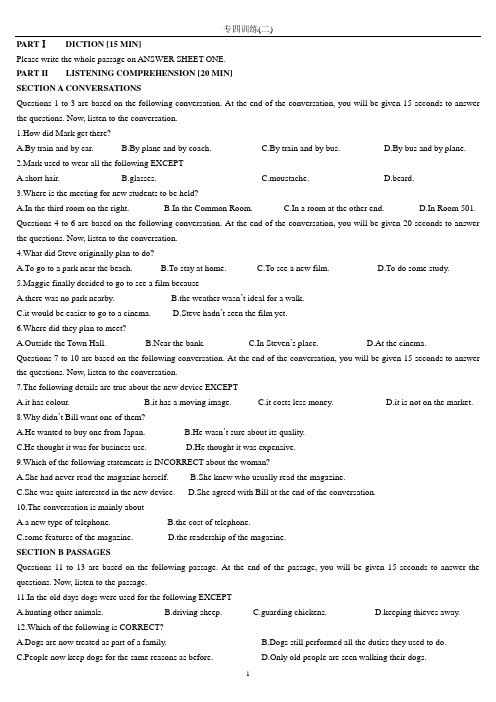
PARTⅠDICTION [15 MIN]Please write the whole passage on ANSWER SHEET ONE.PART II LISTENING COMPREHENSION [20 MIN]SECTION A CONVERSATIONSQuestions 1 to 3 are based on the following conversation. At the end of the conversation, you will be given 15 seconds to answer the questions. Now, listen to the conversation.1.How did Mark get there?A.By train and by car.B.By plane and by coach.C.By train and by bus.D.By bus and by plane.2.Mark used to wear all the following EXCEPTA.short hair.B.glasses.C.moustache.D.beard.3.Where is the meeting for new students to be held?A.In the third room on the right.B.In the Common Room.C.In a room at the other end.D.In Room 501. Questions 4 to 6 are based on the following conversation. At the end of the conversation, you will be given 20 seconds to answer the questions. Now, listen to the conversation.4.What did Steve originally plan to do?A.To go to a park near the beach.B.To stay at home.C.To see a new film.D.To do some study.5.Maggie finally decided to go to see a film becauseA.there was no park nearby.B.the weather wasn’t ideal for a walk.C.it would be easier to go to a cinema.D.Steve hadn’t seen the film yet.6.Where did they plan to meet?A.Outside the Town Hall.B.Near the bank.C.In Steven’s place.D.At the cinema.Questions 7 to 10 are based on the following conversation. At the end of the conversation, you will be given 15 seconds to answer the questions. Now, listen to the conversation.7.The following details are true about the new device EXCEPTA.it has colour.B.it has a moving image.C.it costs less money.D.it is not on the market.8.Why didn’t Bill want one of them?A.He wanted to buy one from Japan.B.He wasn’t sure about its quality.C.He thought it was for business use.D.He thought it was expensive.9.Which of the following statements is INCORRECT about the woman?A.She had never read the magazine herself.B.She knew who usually read the magazine.C.She was quite interested in the new device.D.She agreed with Bill at the end of the conversation.10.The conversation is mainly aboutA.a new type of telephone.B.the cost of telephone.C.some features of the magazine.D.the readership of the magazine.SECTION B PASSAGESQuestions 11 to 13 are based on the following passage. At the end of the passage, you will be given 15 seconds to answer the questions. Now, listen to the passage.11.In the old days dogs were used for the following EXCEPTA.hunting other animals.B.driving sheep.C.guarding chickens.D.keeping thieves away.12.Which of the following is CORRECT?A.Dogs are now treated as part of a family.B.Dogs still performed all the duties they used to do.C.People now keep dogs for the same reasons as before.D.Only old people are seen walking their dogs.13.The passage is mainly aboutA.what dogs can do.B.how to keep dogs.C.dogs and their masters.D.reasons for keeping dogs. Questions 14 to 17 are based on the following passage. At the end of the passage, you will be given 20 seconds to answer the questions. Now, listen to the passage.14.According to the passage, the working conditions in the new placeA.are the same as the speaker is used to.B.are expected to be rather poor.C.are just as adequate.D.are not yet clear.15.What is the speaker going to do in the new place?A.Travelling.B.Studying.C.Settling down.D.Teaching.16.The speaker expectsA.fewer choices of food.B.many ways to do washing.C.modern lighting facilities.D.new types of drinking water.17.From the passage we learn that the speakerA.is unprepared for the new post.B.is unclear about the conditions there.C.is ready for all the difficulties there.D.is eager to know more about the post.Questions 18 to 20 are based on the following passage. At the end of the passage, you will be given 15 seconds to answer the questions. Now, listen to the passage.18.According to the passage, when are children first expected to study hard?A.Before 6 years of age.B.Between 6 and 10.C.After 10 years of age.D.After 12 years of age.19. Parents who abuse their children tend to have the following problems EXCEPTA.religious problems.B.emotional problems.C.financial problems.D.marriage problems.20.Which of the following statements is CORRECT?A.Boys and girls are equally energetic.B.Parents have higher expectations for boys.C.Some parents lack skills to deal with their kids.D.Some parents are ill-educated and ill-tempered. SECTION C NEWS BROADCASTQuestions 21 to 23 are based on the following news. At the end of the news item, you will be given 15 seconds to answer the questions. Now, listen to the news.21.What has happened to the Cubans?A.They set foot in Floria.B.They were drowned.C.They were flown to the U.S.D.They were sent back to Cuba.22.How did the Cubans try to enter the U.S.?A.In a small boat.B.In an old truck.C.By swimming.D.By driving.Questions 23 are based on the following news. At the end of the news item, you will be given 10 seconds to answer the questions. Now, listen to the news.23.How many cities will have air quality monitoring systems installed by the end of this year?A.42 cities.B.220 cities.C. 150 cities.D. 262 cities.Questions 24 and25 are based on the following news. At the end of the news item, you will be given 10 seconds to answer the questions. Now, listen to the news.24. Altogether how many people were reported missing?A. 68.B.90.C. 150.D. 40.25.Which of the following details is INCORRECT?A.The two ferries sank on different days.B.The accidents were caused by storms.C.The two ferries sank on the same river.D.More people were rescued from the first ferry.Questions 26 are based on the following news. At the end of the news item, you will be given 10 seconds to answer the questions.Now, listen to the news.26.What is the news item mainly about?A.Indonesian government policies.B.Australia’s support to the UN assistance mission.C.Opening of an Australian consulate in East Timor.D.Talks between Australia and Indonesia.Questions 27 to 28 are based on the following news. At the end of the news item, you will be given 15 seconds to answer the questions. Now, listen to the news.27. The news item is mainly about a joint venture betweenA.a US company and a UK company.B.a Swiss company and a UK company.C.two Taiwanese companies.D.a mainland company and a US company.28.Who will provide the distribution networks in the joint venture?A.Unilever.B.Nestle.C.PepsiCo.D.Coca Cola.Questions 29 to 30 are based on the following news. At the end of the news item, you will be given 15 seconds to answer the questions. Now, listen to the news.29.Who staged the protect on Saturday?A.The soldiers.B.The peace camp.C.The militants.D. The hardliners.30. Which of the following details about the news is INCOPPECT?A.13 soilders were killed last week.B.100,000 people participated in the protest.C. The protesters demanded a pullout from Gaza.D.The Prime Minister rejected the pullout plan.PART ⅢCLOZE [15 MIN]There are many superstitions in Britain, but one of the most ( 31 )_held is that it is unlucky to walk under a ladder--- even if it means (32)_the pavement into a busy street! (33)_you must pass under a ladder you can (34)_bad luck by crossing your fingers and (35)_them crossed until you have seen a dog. (36)_, you may lick your finger and (37)_a cross on the toe of your shoe, and not look again at the shoe until the (38)_has dried.Another common (39)_is that it is unlucky to open an umbrella in the house---it will either bring (40)_to the person who opened it or to the whole (41)_. Anyone opening an umbrella in fine weather is (42)_, as it inevitably brings rain! The number 13 is said to be unlucky for some, and when the 13th day of the month (43)_on a Friday, anyone wishing to avoid a bad event had better stay (44)_.The worst misfortune that can happen to a person is caused by breaking a mirror, (45)_it brings seven years of bad luck! The superstition is supposed to (46)_in ancient times, when mirrors were considered to be tools of the gods.Black cats are generally considered lucky in Britain, even though they are (47)_witchcraft. It is (48)_lucky if a black cat crosses your path-although in America the exact opposite belief prevails. Finally, a commonly held superstition is that of touching wood (49)_luck. This measure is most often taken if you think you have said something that is tempting fate, such as “my car has never (50)_, touch wood?”31. A broadly B widely C quickly D speedily32. A running from B jumping off C stepping off D keeping from33. A If B As C Though D Unless34. A erase B remove C avoid D ease35. A keep B keeping C kept D to keep36. A Consequently B However C Comparatively D Alternatively37. A make B print C perform D produce38. A label B symbol C mark D cut39. A argument B superstition C opinion D idea40. A loss B difficulty C tragedy D misfortune41. A house B household C home D circle42. A unwise B unintelligent C unpopular D unfortunate43. A falls B arrives C drops D happens44. A away B outdoors C indoors D far45. A when B as C if D though46. A have originated B be originating C be originated D originate47. A concerned about B related with C associated with D connected in48. A especially B specially C frequently D rarely49. A as B for C in D of50. A broken up B broken off C broken away D broken downPART IV GRAMMAR&VOCABULARY [15MIN]51. __ dull he may be, he is certainly a very successful top executive.A AlthoughB whateverC AsD However52. If only I __ play the guitar as well as you!A wouldB couldC shouldD might53. The party, __ I was the guest of honour, was extremely enjoyable.A by whichB for whichC to whichD at which54. It’s high time we __ cutting down the rainforests.A stoppedB had to stopC shall stopD stop55. The student said there were a few points in the essay he __ impossible to comprehend.A has foundB was findingC had foundD would find56. Loudspeakers were fixed in the hall so that everyone __ an opportunity to hear the speech.A ought to haveB must haveC may haveD should have57. I am surprised __ this city is a dull place to live in.A that you should thinkB by what you are thinkingC that you would thinkD with what you were thinking58. Susan is very hardworking, but her pay is not __ for her work.A enough goodB good enoughC as good enoughD good as enough59. It is imperative that the government __ more investment into the shipbuilding industry.A attractsB shall attractC attractD has to attract60. Land belongs to the city; there is __ thing as private ownership of land.A no such aB not suchC not such aD no such61. My daughter has walked eight miles today. We never guessed that she could walk __ far.A /B suchC thatD as62. The statistics __ that living standards in the area have improved drastically in recent times.A provesB is provingC are provingD prove63. There are only ten apples left in the baskets, __ the spoilt ones.A not countingB not to countC don’t countD having not counted64. It was __ we had hopedA more a success thanB a success more thanC as much of a success asD a success as much as65. There used to be a petrol station near the park, __?A didn’t itB doesn’t thereC usedn’t it?D didn’t there66. It is an offence to show __ against people of different races.A distinctionB differenceC separationD discrimination67. A great amount of work has gone into __ the Cathedral to its previous splendour.A refreshingB restoringC renovatingD renewing68. The thieves fled with the local police close on their __.A backsB necksC toesD heels69. The economic recession has meant that job __ is a rare thing.A securityB safetyC protectionD secureness70. Many people nowadays save money to __ for their old age.A caterB supplyC provideD equip71. The tone of the article __ the writer’s mood at the time.A reproducedB reflectedC imaginedD imitated72. This is not the right __ to ask for my help; I am far too busy even to listen!A momentB situationC opportunityD circumstance73. The job of a student accommodation officer __ a great many visits to landladies.A concernsB offersC asksD involves74. Our family doctor’s clinic __ at the junction of two busy roads.A restsB standsC staysD seats75. She was so fat that she could only just __ through the door.A assembleB appearC squeezeD gather76. After the heavy rain, a builder was called to repair the roof, which was __.A leakingB tricklingC drippingD floating77. The reception was attended by __ members of the local community.A excellentB conspicuousC prominentD noticeable78. Share prices on the Stock Exchange plunged sharply in the morning but __ slightly in the afternoon.A regainedB recoveredC restoredD revived79. His __ brain has worked away on the idea of a universal cure.A richB quickC productiveD fertile80. The couple has donated a not __ amount of money to the foundation.A inconsiderableB inconsiderateC inaccurateD incomparablePART ⅤREADING COMPREHENSION [25MIN]TEXT AIn the case of mobile phones, change is everything. Recent research indicates that the mobile phone is changing not only our culture, but our very bodies as well.First, let’s talk about culture. The difference between the mobile phone and its parent, the fixed-line phone, is that a mobile number corresponds to a person, while a landline goes to a place. If you call my mobile, you get me. If you call my fixed-line phone, you get whoever answers it.This has several implications. The most common one, however, and perhaps the thing that has changed our culture forever, is the “meeting” influence. People no longer need to make firm plans about when and where to meet. Twenty years ago, a Friday night would need to be arranged in advance. You needed enough time to allow everyone to get from their place of work to the first meeting place. Now, however, a night out can be arranged on the run. It is no longer “see you there at 8”, but “text me aroun d 8 and we’ll see where we all are”.Texting changes people as well. In their paper, “insights into the Social and Psychological Effects of SMS Text Messaging”,two British researchers distinguished between two types of mobile phone users: the “talkers” and the “texters”-those who prefer voice to text message and those who prefer text to voice.They found that the mobile phone’s individuality and privacy gave texters the ability to express a whole new outer personality. Texters were likely to report that their family would be surprised if they were to read their texts. This suggests that texting allowed texters to present a self-image that differed from the one familiar to those who knew them well.Another scientist wrote of the changes that mobiles have brought to body language. There are two kinds that people use while speaking on the phone. There is the “speakeasy”: the head is held high, in a self-confident way, chatting away. And there is the “spacemaker”: these people focus on themselves and keep out ot her people.Who can blame them? Phone meetings get cancelled or reformed and camera-phones intrude on people’s privacy. So, it is understandable if your mobile makes you nervous. But perhaps you needn’t worry so much. After all, it is good to talk.81 when people plan to meet nowadays, theyA arrange the meeting place beforehandB postpone fixing the place till last minuteC seldom care about when and where to meetD still love to work out detailed meeting plans.82 According to the two British researchers, the social and psychological effect are mostly likely to be seen onA TALKERSB the "speakeasy"C the “spacemaker”D texters83 We can infer from the passage that the texts sent by texters areA quite revealingB well writtenC unacceptable by othersD shocking to others84 according to the passage, who is afraid of being heard while talking on the mobile?A TalkersB T he “speakeasy”C T he “spacemaker”D Texters85 an appropriate title for the passage might beA The SMS effectB Cultural implication of mobile useC Change in the use of the mobileD Body language and the mobile phone!TEXT BOver the last 25 years, British society has changed a great deal-or at least many parts of it have. In some ways, however, very little has changed, particularly where attitudes are concerned. Ideas about social class-whether a person is “working-class” or “middle-class”--are one area in which changes have been extremely slow.In the past, the working-class tended to be paid less than middle-class people, such as teachers and doctors. As a result of this and also of the fact that workers’ jobs were generally much less secure, distinct differences in life-styles and attitudes came into existence. The typical working man would collect his wages on Friday evening and then, it was widely believed, having given his wife her “housekeeping”, would go out and squander the rest on beer and betting.The stereotype of what a middle-class man did with his money was perhaps nearer the truth. He was-and still is – inclined to take a longer-term view. Not only did he regard buying a house as a top priority, but he also considered the education of his children as extremely important. Both of these provided him and his family with security. Only in very few cases did workers have the opportunity (or the education and training) to make such long-term plans.Nowadays, a great deal has changed. In a large number of cases factory workers earn as much, if not more, than their middle-class supervisors. Social security and laws to improve job-security, combined with a general rise in the standard of living since the mid-fifties of the 20th century, have made it less necessary than before to worry about “tomorrow”. Working-class people seem slowly to be losing the feeling of inferiority they had in the past. In fact there has been a growing tendency in the past few years for the middle-classes to feel slightly ashamed of their position.The changes in both life-styles and attitudes are probably most easily seen amongst younger people. They generally tend to share very similar tastes in music and clothes, they spend their money in having a good time, and save for holidays or longer-term plans when necessary. There seems to be much less difference than in previous generations. Nevertheless, we still have a wide gapbetween the well-paid (whatever the type of job they may have) and the low-paid. As long as this gap exists, there will always be a possibility that new conflicts and jealousies will emerge, or rather that the old conflicts will re-appear, but between different groups. 86, which of the following is seen as the cause of class differences in the past?A Life style and occupationB Attitude and incomeC Income and job securityD Job security and hobbies87 the writer seems to suggest that the description of__is closer to truth?A middle –class ways of spending moneyB working-class ways of spending the weekendC working-class drinking habitsD middle-class attitudes88 According to the passage, which of the following is NOT a typical feature of the middle -class?A Desiring for securityB Making long-term plansC Having priorities in lifeD Saving money89 Working-class people's sense of security increased as a result of all the following factors EXCEPTA better social securityB more job opportunitiesC higher living standardD better legal protection.90.Which of the following statements is INCORRECT?A Changes are slowly taking place in all sectors of the British society.B The gap between working -class and middle- class young people is narrowing.C Differences in income will remain but those in occupation will disappear.D Middle-class people may sometimes feel inferior to working-class people.TEXT CFor several days I saw little of Mr. Rochester. In the morning he seemed much occupied with business, and in the afternoon gentlemen from the neighourhood called and sometimes stayed to dine with him. When his foot was well enough, he rode out a great deal.During this time, all my knowledge of him was limited to occasional meetings about the house, when he would sometimes pass me coldly, and sometimes bow and smile. His changes of manner did not offend me, because I saw that I had nothing to do with the cause of them.One evening, several days later, I was invited to talk to Mr. Rochester after dinner. He was sitting in his armchair, and looked not quite so severe, and much less gloomy. There was a smile on his lips, and his eyes were bright, probably with wine. As I was looking at him, he suddenl y turned, and asked me, “do you think I’m handsome, Miss Eyre?”The answer somehow slipped from my tongue before I realized it: ‘No, sir.”“A h, you really are unusual! You are a quiet, serious little person, but you can be almost rude.”“Sir, I’m sorry. I should have said that beauty doesn’t matter, or something like that,”“No, you shouldn’t! I see, you criticize my appearance, and then you stab me in the back! You have honesty and feeling. There are not many girls like you. But perhaps I go too fast. Perhaps you have awful faults to counterbalance your few good points.”I thought to myself that he might have too. He seemed to read my mind, and said quickly,“Yes, you’re right. I have plenty of faults. I went the wrong way when I was twenty-one, and have never found the right path again. I might have been very different.I might have been as good as you, and perhaps wiser. I am not a bad man, take my word for it, but I have done wrong. It wasn’t my character, but circumstances which were to blame. Why do I tell you all this? Because you’re the sort of person people tell their problems and secrets to, because you’re sympathetic and give them hope.”It seemed he had quite a lot to talk to me. He didn’t seem to like to finish the talk quickly, as was the case for the first time.“Don’t be afraid of me, Miss Eyre.” He continued. “you don’t relax or laugh very much, perhaps because of the effect Lowood school has had on you. But in time you will be more natural with me, and laugh, and speak freely. You’re like a bird in a cage. When you get out of the cage, you’ll fly very high. Good night.”91. At the beginning Miss Eyre 's impressions of Mr.Rochester were all EXCEPTA busyB sociableC friendlyD changeable92. In "....and all my knowledge of him was li mited to occasional meetings about the house,…”(the second paragraph), the word “about” meansA aroundB onC outsideD concerning.93. Why did Mr.Rochester say" ..and the you stab me in the back!" (the 7th paragraph)?.A Because Jane had intended to kill him with a knife.B Because Jane had intended to be more critical.C Because Jane had regretted having talked to him.D Because Jane had said something else to correct herself.94. From what Mr.Rochest told Miss Eyre, we can conclude that he wanted toA tell her all his troubles.B tell her his life experience.C change her opinion of him.D change his circumstances.95. At the end of the passage, Mr. Rochester soundedA rudeB coldC friendlyD encouraging.TEXT DThe ideal companion machine-the computer- would not only look, feel, and sound friendly but would also be programmed to behave in a pleasant manner. Those qualities that make interaction with other people enjoyable would be imitated as closely as possible, and the machine would appear to be charming, and easygoing.Its informal conversational style would make interaction comfortable, and yet the machine would remain slightly unpredictable and therefore interesting. In its first encounter it might be somewhat hesitant, but as it came to know the user it would progress to a more relaxed and intimate style. The machine would not be a passive participant but would add its own suggestions, information, and opinions; it would sometimes take the initiative in developing or changing the topic and would have a personality of its own.Friendships are not made in a day, and the computer would be more acceptable as a friend if it imitated the gradual changes that occur when one person is getting to know another. At an appropriate time it might also express the kind of affection that stimulates attachment and intimacy. The whole process would be accomplished in a subtle way to avoid giving an impression of over-familiarity that would be likely to produce irritation. After experiencing a wealth of powerful, well-timed friendship indicators, the user would be very likely to accept the computer as far more than a machine and might well come to regard it as a friend.An artificial relationship of this type would provide many of the benefits that people obtain from interpersonal friendships. The machine would participate in interesting conversation that could continue from previous discussions. It would have a familiarity with the user’s life as revealed in earlier contact, and it would be understanding and good-humored. The computer’s own personality would be lively and impressive, and it would develop in response to that of the user. With features such as these, the machine might indeed become a very attractive social partner.96. Which of the following is NOT a feature of the ideal companion machine?A Active in communicationB Attractive in personality.C enjoyable in performance.D unpredictable in behaviour97. The computer would develop friendships with humans in a (n)___ way.A quickB unpredictableC productiveD inconspicuous.98. Which of the following aspects is NOT mentioned when the passage discusses the benefits of artificial relationships?A Being able to pick up an interesting conversation.B Being sensitive to earlier contact.C Being ready to learn about the person's life.D Having a pleasant and adaptable personality.99Throughout the passage, the author is ____ in his attitude towards the computerA favourableB criticalC vagueD hesitant100. Which might be the most appropriate title of the passage?A Artificial relationships .B How to form intimate relationshipsC The affectionate machineD Humans and computers。
日语四级考试
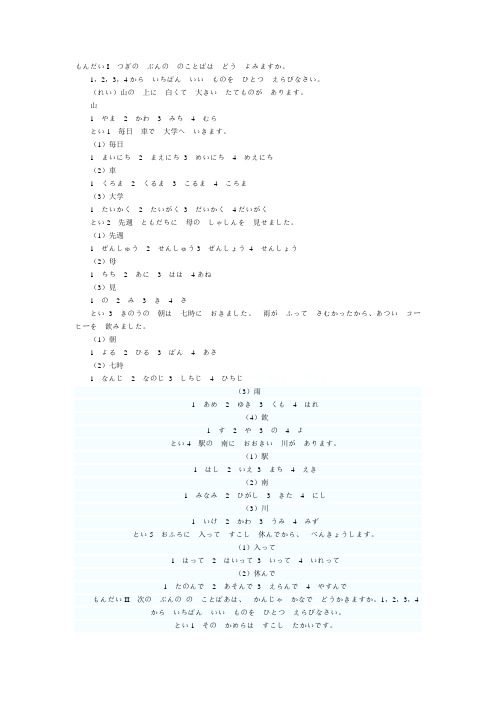
もんだいIつぎのぶんののことばはどうよみますか。
1,2,3,4からいちばんいいものをひとつえらびなさい。
(れい)山の上に白くて大きいたてものがあります。
山1やま2かわ3みち4むらとい1毎日車で大学へいきます。
(1)毎日1まいにち2まえにち3めいにち4めえにち(2)車1くろま2くるま3こるま4ころま(3)大学1たいかく2たいがく3だいかく4だいがくとい2先週ともだちに母のしゃしんを見せました。
(1)先週1ぜんしゅう2せんしゅう3ぜんしょう4せんしょう(2)母1ちち2あに3はは4あね(3)見1の2み3き4さとい3きのうの朝は七時におきました。
雨がふってさむかったから、あついコーヒーを飲みました。
(1)朝1よる2ひる3ばん4あさ(2)七時1なんじ2なのじ3しちじ4ひちじ来源:考试大-小语种考试(3)雨1あめ2ゆき3くも4はれ(4)飲1す2や3の4よとい4駅の南におおきい川があります。
(1)駅1はし2いえ3まち4えき(2)南1みなみ2ひがし3きた4にし(3)川1いけ2かわ3うみ4みずとい5おふろに入ってすこし休んでから、べんきょうします。
(1)入って1はって2はいって3いって4いれって(2)休んで1たのんで2あそんで3えらんで4やすんでもんだいII次のぶんののことばあは、かんじゃかなでどうかきますか。
1,2,3,4からいちばんいいものをひとつえらびなさい。
とい1そのかめらはすこしたかいです。
(1)すこし1示し2小い3少し4不し(2)たかい1長い2高い3多い4安いとい2ドアのみぎにでんきにすいっちがあります。
(1)みぎ1右2石3後4戸(2)でんき1電気2天気3電器4電機(3)すいっち1スイッテ2ネイッテ3スイッチ4ヌイッチとい3いつもここでしんぶんをかいます。
(1)しんぶん1新文2新分3新聞4新本(2)か1員2貿3貸4買とい4らいげつのむいかにともだちがきます。
来源:考试大-小语种考试责编:xyq 评论纠错(1)むいか1 八日2九日3三日4六日(2)き1来2木3気4行もんだいIII次のぶんの()のところになにをいれますか。
日语专业四级考试试题 绝密
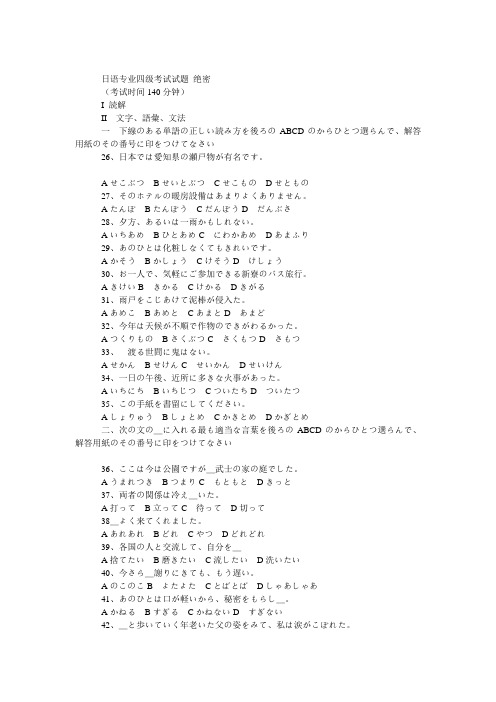
日语专业四级考试试题绝密(考试时间140分钟)I 読解II文字、語彙、文法一下線のある単語の正しい読み方を後ろのABCDのからひとつ選らんで、解答用紙のその番号に印をつけてなさい26、日本では愛知県の瀬戸物が有名です。
AせこぶつBせいとぶつCせこものDせともの27、そのホテルの暖房設備はあまりよくありません。
AたんぽBたんぼうCだんぼうDだんぶさ28、夕方、あるいは一雨かもしれない。
AいちあめBひとあめCにわかあめDあまふり29、あのひとは化粧しなくてもきれいです。
AかそうBかしょうCけそうDけしょう30、お一人で、気軽にご参加できる新寮のバス旅行。
AきけいBきかるCけかるDきがる31、雨戸をこじあけて泥棒が侵入た。
AあめこBあめとCあまとDあまど32、今年は天候が不順で作物のできがわるかった。
AつくりものBさくぶつCさくもつDさもつ33、渡る世間に鬼はない。
AせかんBせけんCせいかんDせいけん34、一日の午後、近所に多きな火事があった。
AいちにちBいちじつCついたちDついたつ35、この手紙を書留にしてください。
AしょりゅうBしょとめCかきとめDかぎとめ二、次の文の_に入れる最も適当な言葉を後ろのABCDのからひとつ選らんで、解答用紙のその番号に印をつけてなさい36、ここは今は公園ですが_武士の家の庭でした。
AうまれつきBつまりCもともとDきっと37、両者の関係は冷え_いた。
A打ってB立ってC待ってD切って38_よく来てくれました。
AあれあれBどれCやつDどれどれ39、各国の人と交流して、自分を_A捨てたいB磨きたいC流したいD洗いたい40、今さら_謝りにきても、もう遅い。
AのこのこBよたよたCとばとばDしゃあしゃあ41、あのひとは口が軽いから、秘密をもらし_。
AかねるBすぎるCかねないDすぎない42、_と歩いていく年老いた父の姿をみて、私は涙がこぼれた。
AすたすたBてくてくCぶらぶらDよたよた43、北海道の海は夏でも冷たい。
大学日语四级练习题1
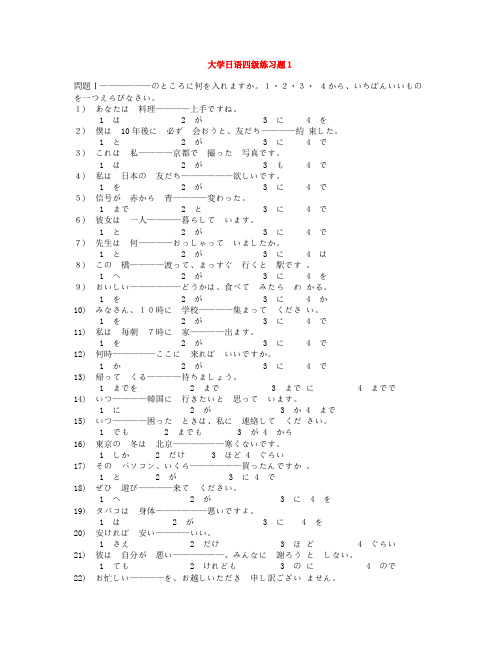
大学日语四级练习题1問題Ⅰ——————のところに何を入れますか。
1・2・3・4から、いちばんいいものを一つえらびなさい。
1) あなたは料理————上手ですね。
1 は2 が3 に4 を2) 僕は10年後に必ず会おうと、友だち————約束した。
1 と2 が3 に4 で3) これは私————京都で撮った写真です。
1 は2 が3 も4 で4) 私は日本の友だち——————欲しいです。
1 を2 が3 に4 で5) 信号が赤から青————変わった。
1 まで2 と3 に4 で6) 彼女は一人————暮らしています。
1 と2 が3 に4 で7) 先生は何————おっしゃっていましたか。
1 と2 が3 に4 は8) この橋————渡って、まっすぐ行くと駅です。
1 へ2 が3 に4 を9) おいしい——————どうかは、食べてみたらわかる。
1 を2 が3 に4 か10) みなさん、10時に学校————集まってください。
1 を2 が3 に4 で11) 私は毎朝7時に家————出ます。
1 を2 が3 に4 で12) 何時—————ここに来ればいいですか。
1 か2 が3 に4 で13) 帰ってくる————待ちましょう。
1 までを2 まで3 までに4 までで14) いつ————韓国に行きたいと思っています。
1 に2 が3 か4 まで15) いつ————困ったときは、私に連絡してください。
1 でも2 までも3 が4 から16) 東京の冬は北京——————寒くないです。
1 しか2 だけ3 ほど4 ぐらい17) そのパソコン、いくら——————買ったんですか。
1 と2 が3 に4 で18) ぜひ遊び————来てください。
1 へ2 が3 に4 を19) タバコは身体——————悪いですよ。
1 は2 が3 に4 を20) 安ければ安い————いい。
1 さえ2 だけ3 ほど4 ぐらい21) 彼は自分が悪い——————、みんなに謝ろうとしない。
2006年日语能力考试四级真题+答案

(28).はじめまして。どうぞ___。 1.ごめんぐださい 2.ごちそうさま 3.こんばんは 4.よろしく
(29).たまごは ___ いりますか。 1.なんこ 2.なんさつ 3.なんだい 4.なんまい
問5・らいねんは ながい やすみが ほしいです。 (24).らいねん 1.未年 2.未年 3.来年 4.来年 (25).ながい 1.辰い 2.弄い 3.兵い 4.長い
問題Ⅲ ______の ところに なにを いれますか。1234から いちばん い い ものを ひとつ えらびなさい。
(26).わたしは よる シャワーを ___。 1.あびます 2.とります 3.なきます 4.ぬぎます
問3・父は 目も 耳も おおきい。 (5).父 1.すち 2.ちぢ 3.しち 4.つち (6).目 1.て 2.あし 3.め 4.はな (7).耳 1.くち 2.あたま 3.みみ 4.からだ
問4・水を 買って いきます。 (8).水 1.くつ 2.みず 3.きって 4.くすり (9).買って 1.かって 2.つくって 3.とって 4.あらって
問1・えいがが すきですが、時間が なくて 見られません。 (1).時間 1.しかん 2.じがん 3.しがん 4.じかん (2).見られません 1.きられません 2.みいられません 3.みられません 4. きいられません
問2・これは 一つ 千円です。 (3).一つ 1.ひとつ 2.ふだつ 3.ふたつ 4.ひどつ (4).千円 1.せいえん 2.せいねん 3.せんねん 4.せんえん
4.この問題用紙は、全部で9ページあります。 This question booklet has 9 pages.
2006年日语四级听力真题 附答案和听力原文
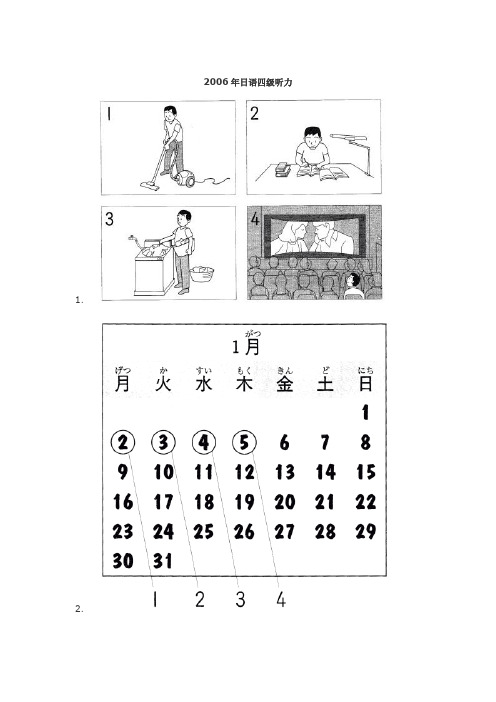
2006年日语四级听力1.2.3.4.5.6.7.8.9.2. 无图题問題I1番女の人と男の人が話しています。
男の人は来週の日曜日の午後何をしますか。
女:ヤンさんは休みの日はいつも何をしていますか。
男:休みの日は朝から掃除と洗濯をします。
そして、午後は買い物をしたり、映画を見たりします。
女:では、来週の日曜日、いっしょに映画を見に行きませんか。
男:ああ、すみません。
来週の月曜日はテストですから、日曜日の午後はうちで勉強します。
女:そうですか。
◆男の人は来週の日曜日の午後何をしますか。
【正解:2】2番女の人と男の人が話しています。
女の人の会社は何日から仕事が始まりますか。
女:田中さんの会社は1月何日から仕事ですか。
男:4日まで休みで、5日から仕事です。
女:いいですね。
わたしの会社は火曜日からもう仕事です。
休みは2日までです。
男:そうですか。
◆女の人の会社は何日から仕事が始まりますか。
【正解:2】3番男の人が話しています。
写真と名前はどうしますか。
男:写真は紙の左に張ってください。
それから、名前は写真の下に書いてください。
◆写真と名前はどうしますか。
【正解:1】4番男の人と女の人が話しています。
男の人に電話するときは何番を押しますか。
男:田中さんの部屋の番号は何番ですか。
女:811です。
男:ああ、わたしの部屋番号は818です。
困ったときは電話してください。
電話するときは始めに9を押して、それから部屋番号を押してください。
女:わかりました。
どうもありがとうございます。
◆男の人に電話するときは何番を押しますか。
【正解:4】5番女の人が話しています。
女の人はどれを見て話していますか。
女:ええ、日本人の大人にお風呂にどのぐらい入るか聞きました。
これを見てください。
一番多かったのは毎日お風呂に入ると答えた人でした。
その次に多かったのが二日に一回入ると答えた人で、毎日お風呂に入る人の半分ぐらいでした。
◆女の人はどれを見て話していますか。
大学日语四级考试真题

大学日语四级考试样题试卷一一、将自己的学校名、姓名、准考证号写在答题卡和试卷二上。
考试结束后,将答题卡、试卷一、试卷二放在桌子上,待监考人员收卷后方可离开考场。
答题卡、试卷一、试卷二均不得带走。
二、仔细读懂题目的说明。
三、在120分钟内答完全部试题,不得拖延时间。
四、客观多项选择试题的答案一定要划在答题卡上,主观试题写在试卷二上。
凡写在试卷一上的答案一律作废。
五、客观多项选择试题只能选一个答案,多选作废。
选定答案后,用HB-2B铅笔按规定在相应字母的中部划一条横线。
正确的方法如下:[A][B][C][D]六、如果要改动答案,必须先用橡皮擦去原来选定的答案。
七、主观试题用钢笔或圆珠笔书写。
Ⅰ聴解セクション(听解部分)(20分間)これから聞くテストを行います。
一、写真問題(图片题)写真か絵を見て質問に答えてください。
はじめに写真か絵について質問します。
その後で文を四つ言います。
その四つの中から正しい答えを一つ選んでください。
文は1回しか言いません。
まず例題をしてみましょう。
例題[A] [B] [C] [D](可先在试卷上选,然后划到答题卡上,下同。
)答えはAです。
このような問題は1から5まであります。
それでは、問題を始めます。
1.2.3.4.5.[A] [B] [C] [D] [A] [B] [C] [D] [A] [B] [C] [D] [A] [B] [C] [D][A] [B] [C] [D]二、応答問題(应答题)始めに一人が短い文を一つ言う。
その後でもう一人がそれに答える。
正しい答えを[A][B][C][D]から、一つ選んでください。
文は一回しか言いない。
まず例題をしてみよう。
例題[A] [B] [C] [D]答えはAです。
このような問題は6から10まであります。
それでは、問題を始めます。
6.[A] [B] [C] [D]7.[A] [B] [C] [D]8.[A] [B] [C] [D]9.[A] [B] [C] [D]10.[A] [B] [C] [D]三、会話問題(对话题)二人の会話を聞いて、質問に答えてください。
日语专四2006真题答案及解析

日语专四2006真题答案及解析在备考日语专四考试过程中,掌握往年真题并进行答案解析是非常重要的。
通过分析真题,可以更好地了解考试的题型和出题思路,有针对性地进行备考。
下面将对2006年日语专四真题进行答案解析,希望对考生的备考有所帮助。
听力部分1. 答案:B解析:题目中提到了和平洋地区,而B选项中的“手提箱大小”是按照和平洋地区的规定来的,因此可以推断B选项是正确答案。
2. 答案:A解析:对话中两人将在5点50分见面,而A选项中的“渐行渐近”符合这一要求,因此A选项是正确答案。
3. 答案:C解析:根据对话内容,可以知道吉田要求足球队员将球踢到柱子上时,球绝对不能超过柱子的高度。
而C选项中的“球踢中了柱子”与此意思相同,因此C选项是正确答案。
4.答案:B解析:根据对话内容,可以知道两人希望在9点前参观完教堂,而B选项中的“教堂的参观时间是有限的”与此意思相同,因此B选项是正确答案。
5. 答案:C解析:根据对话内容,可以知道两人打算乘坐在11点20分发车的火车。
而C选项中的“11点10分乘火车”符合题意,因此C选项是正确答案。
阅读理解部分第一篇6. 答案:C解析:文章提到赫尔利教授认为大脑是构成人格的重要因素,并举了学习世界语的例子来支持他的观点。
因此C选项中的“大脑是决定人格的一个重要因素”与此意思相符,因此C选项是正确答案。
7. 答案:D解析:根据文章内容,可以知道人格的形成因素中既包括遗传因素,也包括后天因素。
而D选项中的“既有遗传的也有后天形成的”与此意思相符,因此D选项是正确答案。
8. 答案:B解析:文章提到尽管有些人可能遗传了聪明的头脑,但如果没有适当的教育和培养,也无法发挥出优势。
因此B选项中的“一个人尽管聪明,如果没有受过良好的教育,也无法发挥自己的优势”与此意思相符,因此B选项是正确答案。
第二篇9. 答案:A解析:根据文章内容,可以知道斯景图是摄影界的先驱者,他将摄影艺术与科学相结合,采用了一些新技术拍摄照片。
06年专四真题及答案详解

PART I Listen to the following passage. Altogether the passage will be read to you four times. Duringthe first read ing, which will be done at no rmal speed, liste n and try to un dersta nd the meaning.For the sec ond and third readi ngs, the passage will be read sentence by senten ce, or phrase byphrase, with in tervals of 15 sec on ds. The last readi ng will be done at no rmal speed aga in andduri ng this time you should check your work. You will the n be give n 2 minu tes to check throughyour work once more.Please write the whole passage on ANSWER SHEET ONE.PART II LISTENING COMPREHENSION [20 MIN]In Sections A B and C you will hear everything ONCE ONLY. Listen carefully and then an swerthe questi ons that follow. Mark the correct an swer to each questi on on An swer Sheet Two.SECTION A CONVERSATIONSIn this sect ion you will hear several con versati ons. Liste n to the con versati ons carefully andthen an swer the questi ons that follow.Questions 1 to 3 are based on the following conversation. At the end of the conversation, youwill be given 15 seconds to answer the questions. Now, listen to the conversation.1. How did Mark get there?A.By train and by car. B.By pla ne and by coach. C.By train and by bus.D.By bus and by pla ne. 2. Mark used to wear all the followi ng EXCEPT A.short hair. B.glasses C.moustache.D.beard. 3. Where is the meeti ng for new stude nts to be held?A.ln the third room on the right. B.ln the Com mon Room. C.ln a room at the other end. D.ln Room 501.Questions 4 to 6 are based on the following conversation. At the end of the conversation, youwill be give n 20 sec onds to an swer the questi ons. Now, liste n to the con versati on.4. What did Steve origi nally plan to do?A.To go to a park n ear the beach. B.To stay at home. C.To see a new film. D.To do some study. 5. Maggie fin ally decided to go to see a film becausePART Questions 7 to 10 are based on the following conversation. At the end of theconversation, you will be given 15 seconds to answer the questions. Now, listen to the con versation.7. The followi ng details are true about the new device EXCEPT06年专四真题DICTIONA. there was no park n earby. C.it would be easier to go to a cinema.6. Where did they plan to meet?A. Outside the Town Hall.C.ln Steven ' s place. B. the weather wasn ' t ideal for a walk.D.Steve hadn ' t seen the film yet. B. Near the bank. D.At the cin ema.9. Which of the followi ng stateme nts is INCORRECT about the woma n?A.She had n ever read the magaz ine herself.B.She knew who usually read the magaz ine.C. She was quite interested in the new device.D.She agreed with Bill at the end of the con versation.10. The con versati on is mainly aboutA.a new type of teleph one.B.the cost of teleph one.C.some features of the magaz ine. D.thereadership of the magaz ine.SECTION B PASSAGESIn this sect ion, you will hear several passages. Liste n to the passages carefully and the n answer the questi ons that follow.Questi ons 11 to 13 are based on the follow ing passage. ,4t the end of the passage, you will begive n 15 sec onds to an swer the questi ons. Now, liste n to the passage.11.In the old days dogs were used for the following EXCEPTA.h un ti ng other ani mals.B.drivi ng sheep.C.guard ing chicke ns.D.keep ing thieves away. 12. Which of the followi ng is CORRECT?A. Dogs are now treated as part of a family.B. Dogs still performed all the duties they used to do.C. People now keep dogs for the same reas ons as before.D. O nly old people are see n walki ng their dogs.13. The passage is mainly aboutA.what dogs can do.B.how to keep dogs.C.dogs and their masters.D.reas ons for keep ing dogs. Questi ons 14 to 17 are based on the follow ing passage. At the end of the passage, you will begive n 20 sec onds to an swer the questi ons. Now, liste n to the passage.14. Accord ing to the passage, the work ing con diti ons in the new placeA.are the same as the speaker is used to.B.are expected to be rather poor.C.are just as adequate.D.are not yet clear. 15. What is the speaker going to do in the new place? A.Travelli ng.B.Study ing.C.Settli ng dow n.D.Teach ing. 16. The speaker expects A.fewer choices of food.B.ma ny ways to do wash ing.C.moder n lighti ng facilities.D.new types of drinking water. 17. From the passage we lear n that the speakerA.is un prepared for the new post.B.is un clear about the con diti ons there.C.is ready for all the difficulties there.D.is eager to know more about the post. Questi ons 18 to 20 are based on the follow ing passage. At the end of the passage, you will begive n 15 sec onds to an swer the questi ons. Now, liste n to the passage.18. Accord ing to the passage,whe n are childre n first expectd to study hard?A. it has colour.C. it costs less mon ey.8. Why didn ' t Bill want one of them?A.He wan ted to buy one from Japa n.C. He thought it was for bus in ess use. B. it has a movi ng image.D. it is not on the B. He wasn ' t sure about its quality. D. He thought it was expe nsive.A.Before 6 years of age.B.Betwee n 6 and 10.C.After 10 years of age.D.After 12 years of age. 19. Parents who abuse their children tend to have the following problems EXCEPT A.religious problems.B.emoti onal problems.C.finan cial problems.D.marriage problems. 20. Which of the followi ng stateme nts is CORRECT?A. Boys and girls are equally en ergetic.B. Pare nts have higher expectati ons for boys.C. Some parents lack skills to deal with their kids.D. Some pare nts are ill-educated and ill-tempered.SECTION C NEWS BROADCASTIn this sect ion, you will hear several n ews items. Liste n to them carefully and the n an swertheQuesti ons 23 are based on the follow ing n ews. At the end of the n ews item, you will be give n10 sec onds to an swer the questi ons. Now, liste n to the n ews.23. How many cities will have air quality mon itori ng systems in stalled by the ned of this year?A.42 cities.B.220 cities.C. 150 cities.D. 262 cities.Questi ons 24 an d25 are based on the follow ing n ews. At the end of the n ews item, you willbe give n 10 sec onds to an swer the questi ons. Now, liste n to the n ews.24. Altogether how many people were reported miss ing?A. 68.B.90.C. 150.D. 40.25. Which of the followi ng details is INCORRECT? A.The two ferries sank on differe nt days. B.The accide nts were caused by storms.C.The two ferries sank on the same river.D.More people were rescued from the first ferry. Questi ons 26 are based on the follow ing n ews. At the end of the n ews item, you will be give n10 sec onds to an swer the questi ons. Now, liste n to the n ews.26. What is the n ews item mainly about?A. lndon esia n gover nment policies.B. Australia ' s support to the UN assistanee mission.C. Opening of an Australian consulate in East Timor.D. Talks betwee n Australia and Indon esia.Questions 27 to 28 are based on the following news. At the end of the news item, you will begive n 15 sec onds to an swer the questi ons. Now, liste n to the n ews.27. The news item is mainly about a joint venture betweenA.a US compa ny and a UK compa ny.B.a Swiss compa ny and a UK compa ny.C.two Taiwa nese compa ni es.D.a mainland compa ny and a US compa ny.questio ns that follow.Questions 21 to 23 are based on the following news. At the end of the news item, you will begive n 15 sec onds to an swer the questi ons. Now. liste n to the n ews.21. W hat has happe ned to the Cuba ns?A.They set foot in Floria.C.They were flown to the U.S.22. H ow did the Cuba ns try to en ter the U.S.?A.ln a small boat. C.By swimmi ng.B.They were drow ned. D.They were sent back to Cuba.B.ln an old truck.D.By drivi ng.28. Who will provide the distribution networks in the joint venture?A.U ni lever.B.Nestle.C.PepsiCo.D.Coca Cola.Questions 29 to 30 are based on the following news. At the end of the news item, you will be give n 15 sec onds to an swer the questi ons. Now, liste n to the n ews.29. Who staged the protect o n Saturday?A.The soldiers.B.The peace camp.C.The milita nts.D. The hardli ners.30. Which of the following details about the news is INCOPPECT?A.13 soilders were killed last week.B.100,000 people participated in the protest.C. The protesters demanded a pullout from Gaza.D.The Prime Minister rejected the pullout plan. 川CLOZEThere are many superstitions in Britain, but one of the most ( 31 ) _held is that it is uniuckyto walk under a ladder--- even if it means (32 ) —the pavement into a busy street! (33 ) —you must pass un der a ladder you can (34) —bad luck by cross ing your fin gers and (35) —them crossed un til you have see n a dog. (36 ) —, you may lick your fin ger and (37 ) —a cross on the toe of your shoe, and not look again at the shoe until the (38 ) —has dried.Ano ther com mon (39) _ is that it is uni ucky to ope n an umbrella in the house---it will either bring (40) _ to the person who opened it or to the whole (41 ) _. Anyone opening an umbrella in fine weather is (42 ) _, as it inevitably brings rain!The number 13 is said to be uniucky for some, and whe n the 13th day of the month (43 ) _ on a Friday, anyone wish ing to avoid a bad eve nt had better stay (44) _ .The worst misfortune that can happen to a person is caused by breaking a mirror, (45) —it brings seven years of bad luck! The superstition is supposed to (46) —in ancient times, when mirrors were considered to be tools of the gods.Black cats are gen erally con sidered lucky in Brita in, even though they are (47 ) _ witchcraft.. it is (48 ) —lucky if a black cat crosses your path-although in America the exact opposite belief prevails. Fin ally, a com mon ly held superstiti on is that of touch ing wood (49 ) _ luck.This measure is most often taken if you think you have said something that is tempting fate, such as n ever (50) —, touch wood? ”31. A broadly B widely C quickly D speedily32. A running from B jumping off C stepp ing off D keep ing from33. A If B As C Though D Un less34. A erase B remove C avoid D ease35. A keep B keep ing C kept D to keep36. A Con seque ntly B However C Comparatively D Alternatively37. A make B print C perform D produce38. A label B symbol C mark D cut39. A argume nt B superstiti on C opi nion D idea40. A loss B difficulty C tragedy D misfort une41.A.house B household C home D circle42. A un wise B unin tellige nt C un popular D unfortun ate43. A falls B arrives C drops D happens44. A away B outdoors C in doors D far45. A whe n B as C if D though46. A have orig in ated B be origi nati ng C be origi nated D origi nate47. A concerned about B related with C associated with D conn ected in51. __dull he may be, he is certa inly a very successful top executive.A AlthoughB whateverC AsD However52. If only I __play the guitar as well as you!A wouldB couldC shouldD might53. The party, __I was the guest of honour, was extremely enjoyable.A by whichB for whichC to whichD at which54. It ' s high time we __ cutt ing dow n the rain forests.A stoppedB had to stopC shall stopD stop55. The student said there were a few points in the essay he __ impossible to comprehend.A has foundB was findingC had foundD would find56. Loudspeakers were fixed in the hall so that everyone__ an opport unity to hear the speech.A ought to haveB must haveC may haveD should have57. I am surprised__ this city is a dull place to live in.A that you should thinkB by what you are thinkingC that you would thinkD with what you were thi nki ng58. Susa n is very hardwork ing, but her pay is not__ for her work.A eno ugh goodB good eno ughC as good eno ughD good as eno ugh59. It is imperative that the gover nment __ more in vestme nt into the shipbuildi ng in dustry.A attractsB shall attractC attractD has to60. Land bel ongs to the city; there is __ thing as private own ership of land.A no such aB not suchC not such aD no such61. My daughter has walked eight miles today. We n ever guessed that she could walk__far.A /B suchC thatD as6 2 . The statistics __ that living standards in the area have improved drastically in recent times.A provesB is provi ngC are prov ingD prove63. There are only ten apples left in the baskets, __ the spoilt on es.A not countingB not to countC don' t count D having not counted64. It was __ we had hopedA more a success tha nB a success more tha nC as much of a success asD a success as much as65. There used to be a petrol stati on n ear the park, __?A didn ' t itB doesn ' t thereC usedn ' t it?D didn' t there 66. It is an offence to show __ aga inst people of differe nt races.A disti nctio nB differe nceC separati onD discrim in ati on67. A great amount of work has gone into __ the Cathedral to its previous sple ndour.A refreshi ngB restori ngC reno vati ngD renewing68. The thieves fled with the local police close on their __.A backsB n ecksC toesD heels69. The econo mic recessi on has meant that job__ is a rare thi ng.A securityB safetyC protect ionD secure ness70. Many people no wadays save money to __ for their old age.A caterB supplyC provideD equip 48. A especially49. A as B specially B for C freque ntly C in D rarely D of 50. A broken up B broke n off C broke n away D broke n down PART IV GRAMMAR &VOCABULARY71. The tone of the article __ the writer ' s mood at the time.A reproducedB reflectedC imagi nedD imitated72. This is not the right __ to ask for my help; I am far too busy even to liste n!A.mome ntB.situati onC.opport un ityD.circumsta nee73. The job of a stude nt accommodati on officer__ a great many visits to Ian dladies.A concernsB offersC asksD in volves74. Our family doctor ' s clinic __at the junction of two busy roads.A restsB sta ndsC staysD seats75. She was so fat that she could only just __ through the door.A assembleB appearC squeezeD gather76. After the heavy rain, a builder was called to repair the roof, which was __.A leak ingB trickli ngC dripp ingD float ing77. The recepti on was atte nded by __ members of the local com muni ty.A excelle ntB con spicuousC prominentD no ticeable78. Share prices on the Stock Exchange plunged sharply in the morning but __slightly in the after noon.A rega inedB recoveredC restoredD revived79. His brain has worked away on the idea of a uni versal cure.A richB quickC productiveD fertile80. The couple has don ated a not__ amount of money to the foun dati on.A incon siderableB incon siderateC in accurateD in comparablePART V READING COMPREHENSIONTEXT AIn the case of mobile phones, change is everything. Recent research indicates that the mobile phone is cha nging not only our culture, but our very bodies as well.First. Let ' s talk about culture. The differe nee betwee n the mobile phone and its pare nt, the fixed-line phone, is that a mobile number corresponds to a person, while a Iandline goes to a place .If you call my mobile, you get me. If you call my fixed-li ne phone, you get whoever an swers it.This has several implicatio ns. The most com mon one, however, and perhaps the thing that has cha nged our culture forever, is the “ meet ing ” in flue nee. People no Ion ger n eed to make firmpla ns about whe n and where to meet. Twenty years ago, a Friday ni ght would n eed to be arran ged in adva nee. You n eeded eno ugh time to allow every one to get from their place of work to the first meeti ng place. Now, however, a ni ght out can be arra nged on the run .It is no Ion ger “ se^ou there at 8 ” , but “ text me around 'arsube/where we all are ”.Texting changes people as well. In their paper, "insightsinto the Social and Psychological Effects of SMS Text Messaging "two British researchers distinguished between two types of mobile phone users: the “ talkers ” and thethose'whterefer'v oice to text message and those who prefer text to voice.They found that the mobile phone ' individuality and privacy gave texters the ability to express a whole new outer personality. Texters were likely to report that their family would be surprised if they were to read their texts. This suggests that text ing allowed texters to prese nt a self-image that differed from the one familiar to those who knew them well.Ano ther scie ntist wrote of the cha nges that mobiles have brought to body Ian guage. There are two kinds thatpeople use while speaking on the phone. There is the “ speakeasy ” : the head ihigh, in a self- con fide nt way, chatt ing away. And there is the “ spacemaker ” o nhese people focus themselves and keep out other people.Who can blame them? Phone meeti ngs get can celled or reformed and camera-pho nes in trude on people ' s privacy. So, it is understandable if your mobile makes you nervous. But perhaps you needn ' t worry so much. After 甸it is good to talk.81 whe n people pla n to meet no wadays, theyA: arrange the meeti ng place beforeha ndB. postp one fixing the place till last minuteC: seldom care about whe n and where to meetD: still love to work out detailed meet ing pla ns.82 According to the two British researchers, the social and psychological effect are mostly likelyto be see n onA: TALKERSB; the "speakeasy"c. the “ spacemaker ”D. texters83 We can infer from the passage that the texts sent by texters areA: quite reveali ngB: well writte nc: un acceptable by others d; shock ing to others84 according to the passage ,who is afraid of being heard while talking on the mobilea: talkersb: the speakeasy c :the spacemaker d: texters85 an appropriate title for the passage might beA: the SMS effectb: cultural implicati on of mobile use c: cha nge in the use of the mobile d: body Ian guage and the mobile pho ne! TEXT B Over the last 25 years, British society has changed a great deal-or at least many parts of it have. In some ways, however, very little has cha nged, particularly where attitudes are concern ed. Ideas about social class- whether a person is “ wohking ” or middle- class -are one area inwhich cha nges have bee n extremely slow.In the past, the work in g-class ten ded to be paid less tha n middle-class people, such as teachers and doctors. As a result of this and also of the fact that workers ' jobs were gener less secure, distinet differences in life-styles and attitudes came into existenee. The typical work ing man would collect his wages on Friday evening and the n, it was widely believed, havi nggiven his wife her “ housekeeping ” , would go out and squander the rest on beer and betting.The stereotype of what a middle-class man did with his money was perhaps nearer the truth. He was-a nd still is -in cli ned to take a Ion ger-term view. Not on ly did he regard buying a house as a top priority, but he also considered the education of his children as extermely important. Both of these provided him and his family with security. Only in very few cases did workers have the opport unity (or the educati on and training) to make such Ion g-term pla ns.Nowadays, a great deal has changed. In a large number of cases factory workers earn as much, if not more, than their middle-class supervisors. Social security and laws to improve job-security,combined with a general rise in the standard of living since the mid-fifties of the 20 th century, have made it less necessary than before to worry about“ tomorrow 'Working -class people seem slowly to be losing the feeling of inferiority they had in the past. In fact there has bee n a grow ing tendency in the past few years for the middle-classes to feel slightly ashamed of their positi on.The cha nges in both life-styles and attitudes are probably most easily see n amon gst youn ger people. They gen erally tend to share very similar tastes in music and clothes, they spe nd their money in hav ing a good time, and save for holidays or Ion ger-term pla ns whe n n ecessary. There seems to be much less differe nee tha n in previous gen eratio ns. Nevertheless, we still have a wide gap betwee n the well-paid (whatever the type of job they may have) and the low-paid. As long as this gap exists, there will always be a possibility that new con flicts and jealousies will emerge, or rather that the old con flicts will re-appear, but betwee n differe nt groups.86, which of the following is seen as the cause of class differences in the past?A: Life style and occupati onB: Attitude and in comeC:I ncome and job securityD: Job security and hobbies87 the writer seems to suggest that the description of ___ is closer to truth?A: middle -class ways of spending moneyB: work in g-class ways of spe nding the weeke ndC: work in g-class drinking habitsD: middle-class attitudes88 According to the passage, which of the following is NOT a typical feature of the middle -class?A: Desiri ng for securityB: Making Ion g-term pla nsC: Having priorities in lifeD: Saving money89 Work in g-class people's sense of security in creased as a resulf of all the follwoi ng factors EXCEPT?A:better social security B: more job opport un ities C: higher livi ng sta ndard D: better legal protect ion.90.Which of the followi ng stateme nts is INCORRECT? A:Changes are slowly taking place in all sectors of the British society.B:The gap betwee n work ing -class and middle- class young people is n arrow ing.C: Differences in in come will rema in but those in occupati on will disappear.D: Middle-class people may sometimes feel in ferior to work in g-class people.TEXT CFor several days I saw little of Mr. Rochester. In the morning he seemed much occupied withbus in ess, and in the after noon gen tleme n from the n eighourhood called and sometimes stayedto dine with him. When his foot was well eno ugh, he rode out a great deal.During this time, all my knowledge of him was limited to occasional meetings about thehouse, whe n he would sometimes pass me coldly, and sometimes bow and smile. His cha ngesof manner did not offend me, because I saw that I had nothing to do with the cause of them.One evening, several days later, I was invited to talk to Mr. Rochester after dinner. He wassitt ing in his armchair, and looked not quite so severe, and much less gloomy. There was a smileon his lips, and his eyes were bright, probably with wine. As I was look ing at him, he sudde nlyturned, and asked me, “ do you think I ' m handsome, Miss Eyre? ”The answer somehow slipped from my tongue before I realized it: ‘ No, sir. ”“Ah, you really are unusual! You are a quiet, serious little person, but you can be almostrude. ”“ Sir, I ' m sorry. I should have said that beauty doesn ' t matter, or something like that, ”“No, you shouldn ' t! I see, you criticize my appearancejnd then you stab me in the back!You have honesty and feeling. There are not many girls like you. But perhaps I go too fast.Perhaps you have awful faults to counterbalanee your few good points. ”I thought to myself that he might have too. He seemed to read my mind, and said quickly,“Yes, you ' re right. I have plenty of faults. I went the wrong way when I was twen ty-one, andhave n ever found the right path aga in. I might have bee n very differe nt.l might have bee n as goodas you, and perhaps wiser. I am not a bad man, take my word for it, but I have done wron g. Itwasn' t my character, but circumstances which were to blame. Why do I tell you all this? Because you ' re the sort of person people tell their problems and secrets to, because you ' re sympagive them hope. ”It seemed he had quite a lot to talk to me. He didn ' t seem to like to finislashe talk quickly,was the case for the first time.“Don' tbe afraid of me, Miss Eyre. "He continued. “ you don' relax or laugh very much, perhaps because of the effect Lowood school has had on you. But i n time you will be more n atural with me, and laugh, and speak freel y. You ' re like a bird in a cage. When you get out of the cage, you ' ll fly very high. Good night. ”91:At the beginning Miss Eyre 's impressions of Mr.Rochester were all EXCEPT A.busy B:sociable C: frie ndly D: cha ngeable92,In "....and all my knowledge of him was limited to occasional meetings about the house, (the …”second paragraph),the word about" meansA:aro und B:o n C:outside D:concerning.93. why did Mr.Rochester say" ..and the you stab me in the back!" (the 7 th paragraph)?.A: Because Jane had inten ded to kill him with a knife.B: Because Jane had intended to be more critical.C: Because Jane had regretted having talked to him.D:Because Jane had said someth ing else to correct herself.94. From what Mr.Rochest told miss Eyre,we can con elude that he wan ted to A: tell her all his troubles.B: tell her his life experie nee. C:cha nge her opinion of him. D cha nge his circumsta nces.95. At the end of the passage , Mr. Rochester soun dedA:rude B: cold C: frien dly D: en courag ing.TEXTDThe ideal compa nion mach in e-the computer- would not only look, feel, and sound frien dly but would also be programmed to behave in a pleasant manner. Those qualities that make in teracti on with other people enjoyable would be imitated as closely as possible, and the mach ine would appear to be charm ing, and easygo ing.lts in formal con versati onal style would make interaction comfortable, and yet the machine would remain slightly unpredictable and therefore interesting. In its first encounter it might be somewhat hesitant, but as it came to know the user it would progress to a more relaxed and intimate style. The machine would not be a passive participant but would add its own suggestions, information, and opinions; it would sometimes take the in itiative in develop ing or cha nging the topic and would have a pers on ality of its own.Friendships are not made in a day, and the computer would be more acceptable as a friend if it imitated the gradualchanges that occur when one person is getting to know another. At an appropriate time it might also express the kind of affect ion that stimulates attachme nt and in timacy. The whole process would be accomplished in a subtle way to avoid giving an impression of over-familiarity that would be likely to produce irritation. After experiencing a wealth of powerful, well-timed frien dship in dicators, the user would be very likely to accept the computer as far more than a mach ine and might well come to regard it as a friend.An artificial relati on ship of this type would provide many of the ben efits that people obtai n from interpersonal friendships. The machine would participate in interesting conversation that could continue from previous discussions. It would have a familiarity with the user ' life as revealed in earlier con tact, and it would be un dersta nding and good- humored. The computer ' s ownpers on ality would be lively and impressive, and it would develop in resp onse to that of the user. With features such as these, the mach ine might in deed become a very attractive social part ner.96. which of the follow ing is NOT a feature of the ideal compa nion mach ine?A:Active in com muni cati on B: Attractive in pers on ality. C: enjoyable in performa nee. D: un predictable in behaviour 97. the computer would develop frien dships with huma ns in a (n) ------- way.A: quickB: un predictable C: productive D: incon spicuous.98. which of the follow ing aspects is NOT men ti oned whe n the passage discusses the ben efits of artificial relati on ships?A:Be ing able to pick up an in terest ing con versati on.B: Being sen sitive to earlier con tact.C: Being ready to lear n about the pers on's life. D:Hav ing a pleasa nt and adaptable pers on ality. 99Throughout the passage,the author is ___________________ in his attitude towards the computerA:favourableB:criticalC: vagueD: hesita nt100. which mgiht be the most appropriate title of the passage?A:Articial relationshios .B: How to form in timate relati on shipsC:The affect ion ate mach ineD: Huma ns and computersPART W WRITINGSECTION A COMPOSITIONRecently a Beijing information company did a survey of student life among more than 700 stude nts in Beijing, Guan gzhou ,Xi 'a n Chen gdu , Shan ghai , Wuha n, Nanj ing ,and Shenyang . The results have show n that 67 perce nt of stude nts think that savi ng money is a good habit while the rest believe that using tomorrow's money tody is better. What do you think?Write on an swer sheet two a compositi ons of about 200 words.You are to write in three parts.In the first part, state specifically what you opinion isIn the sec ond part, support your opinion with appropriate details.In the last part, bring what you have written to a natural conclusion or a summary.You should supply an appropriate title for you composition.。
2006年普通高等学校招生全国统一考试日语
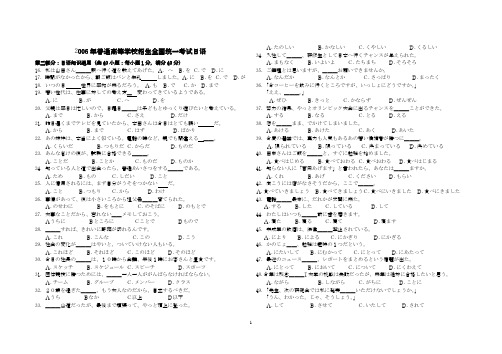
2006年普通高等学校招生全国统一考试日语第二部分:日语知识运用(共40小题:每小题1分,满分40分)16.私は山田さん___駅へ行く道を教えてあげた。
A. へB.をC.でD.に17.時間がなかったから、朝ご飯はパンと牛乳しました。
A.にB.をC.でD.が18.いつの日世界に平和が来るだろう。
A.もB.でC.かD.まで19.若い世代は、仕事に対しての考え方_変わってきているようである。
A.にB.がC.へD.を20.父親は平日は忙しいので、日曜日___は子どもとゆっくり遊びたいと考えている。
A.までB.からC.さえD.だけ21.昨日遅くまでテレビを見ていたから、本田さんは今日はとても眠いだ。
A.からB.までC.はずD.ばかり22.あの姉妹は、本当によく似ている。
電話の時など、親でも間違える__。
A.くらいだB.つもりだC.からだD.ものだ23.あんな怠けの彼が、試験に合格できる___。
A.ことだB.ことかC.ものだD.ものか24.知っている人と道で出会ったら、普通あいさつをする___である。
A.ためB.ものC.しだいD.こと25.人に信用されるには、まず自分がうそをつかないだ。
A.ことB.つもりC.からD.わけ26.事情があって、彼は小さいころから祖父母___育てられた。
A.のせわにB.をもとにC.のそばにD.のもとで27.大事なことだから、忘れない__メモしておこう。
AうちにBところにCことでDもので28.___すれば、きれいに野菜が切れるんです。
A.これB.こんなC.このD.こう29.社会の変化が___はやいと、ついていけない人もいる。
A.これほどB.それほどC.このほどD.そのほど30.今日の社長の___は、10時から会議、午後1時にお客さんと昼食です。
A.スケッチB.スケジュールC.スピーチD.スポーツ31.団体競技に勝つためには、___一人一人ががんばらなければならない。
A.チームB.グループC.メンバーD.クラス32.20歳を過ぎた___、もう大人なのだから、自立するべきだ。
日语专四
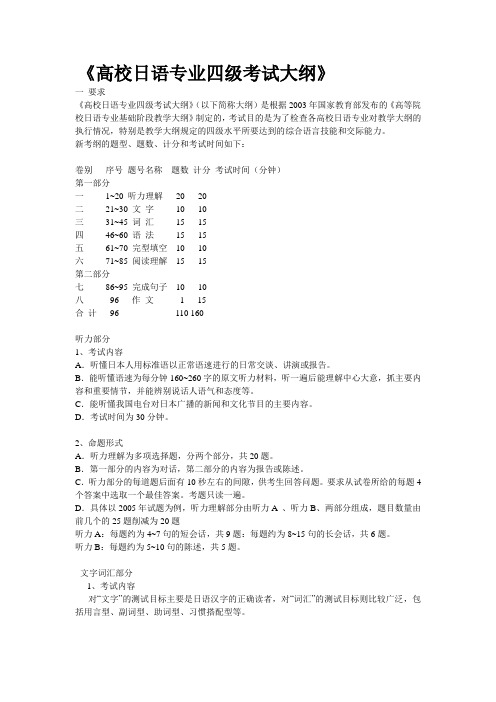
《高校日语专业四级考试大纲》一要求《高校日语专业四级考试大纲》(以下简称大纲)是根据2003年国家教育部发布的《高等院校日语专业基础阶段教学大纲》制定的,考试目的是为了检查各高校日语专业对教学大纲的执行情况,特别是教学大纲规定的四级水平所要达到的综合语言技能和交际能力。
新考纲的题型、题数、计分和考试时间如下:卷别序号题号名称题数计分考试时间(分钟)第一部分一1~20 听力理解20 20二21~30 文字10 10三31~45 词汇15 15四46~60 语法15 15五61~70 完型填空10 10六71~85 阅读理解15 15第二部分七86~95 完成句子10 10八96 作文 1 15合计 96 110 160听力部分1、考试内容A.听懂日本人用标准语以正常语速进行的日常交谈、讲演或报告。
B.能听懂语速为每分钟160~260字的原文听力材料,听一遍后能理解中心大意,抓主要内容和重要情节,并能辨别说话人语气和态度等。
C.能听懂我国电台对日本广播的新闻和文化节目的主要内容。
D.考试时间为30分钟。
2、命题形式A.听力理解为多项选择题,分两个部分,共20题。
B.第一部分的内容为对话,第二部分的内容为报告或陈述。
C.听力部分的每道题后面有10秒左右的间隙,供考生回答问题。
要求从试卷所给的每题4个答案中选取一个最佳答案。
考题只读一遍。
D.具体以2005年试题为例,听力理解部分由听力A 、听力B、两部分组成,题目数量由前几个的25题削减为20题听力A:每题约为4~7句的短会话,共9题:每题约为8~15句的长会话,共6题。
听力B:每题约为5~10句的陈述,共5题。
文字词汇部分1、考试内容对“文字”的测试目标主要是日语汉字的正确读者,对“词汇”的测试目标则比较广泛,包括用言型、副词型、助词型、习惯搭配型等。
2、命题形式本部分为多项选择题,由25道组成,每题有四个选项。
其中汉字的读法有10题,占10分(前5个根据汉字写出读者,后5个为根据读者写出汉字),词汇的用法有15题,占15分。
2006年日语四级考试试题及答案

2006年日语四级考试试题及答案問題Ⅰ___のことばはどうよみますか。
1234からいちばんいいものをえらびなさい。
問1・えいががすきですが、時間がなくて見られません。
(1).時間1.しかん2.じがん3.しがん4.じかん(2).見られません1.きられません2.みいられません3.みられません4.きいられません問2・これは一つ千円です。
(3).一つ1.ひとつ2.ふだつ3.ふたつ4.ひどつ(4).千円1.せいえん2.せいねん3.せんねん4.せんえん問3・父は目も耳もおおきい。
(5).父1.すち2.ちぢ3.しち4.つち(6).目1.て2.あし3.め4.はな(7).耳1.くち2.あたま3.みみ4.からだ問4・水を買っていきます。
(8).水1.くつ2.みず3.きって4.くすり(9).買って1.かって2.つくって3.とって4.あらって問5・ドアの前に立ってください。
(10).前1.まい2.めえ3.めい4.まえ(11).立って1.たって2.すわって3.のって4.とまって問6・まだCDを半分しか聞いていません。
(12).半分1.はんぷん2.はんぶん3.ほんぶん4.ほんぷん(13).聞いて1.きいて2.おいて3.ひらいて4.はたらいて問7・あの古いいえには電話がありません。
(14).古い1.ぬるい2.わるい3.ふるい4.まるい(15).電話1.でんき2.でんわ3.てんわ4.てんき問題Ⅱ__のことばはどうかきますか。
1234からいちばんいいものをひとつえらびなさい。
問1・さとうさんはきょうがっこうをやすんだ。
(16).がっこう1.学校2.字校3.字枚4.学枚(17).やすんだ1.体すんだ2.体んだ3.休すんだ4.休んだ問2・これはなんのばーていーですか。
(18).なん1.同2.何3.向4.伺(19).ぱーてぃー1.ベーティー2.バーティー3.パーディー4.パーティー問3・あめがふっていますからいきません。
(20).あめ1.冊2.両3.雨4.再(21).いきません1.行きません2.仕きません3.代きません4.征きません問4・わたしのかいしゃはあのビルのなかです。
日语专业四级考试样题
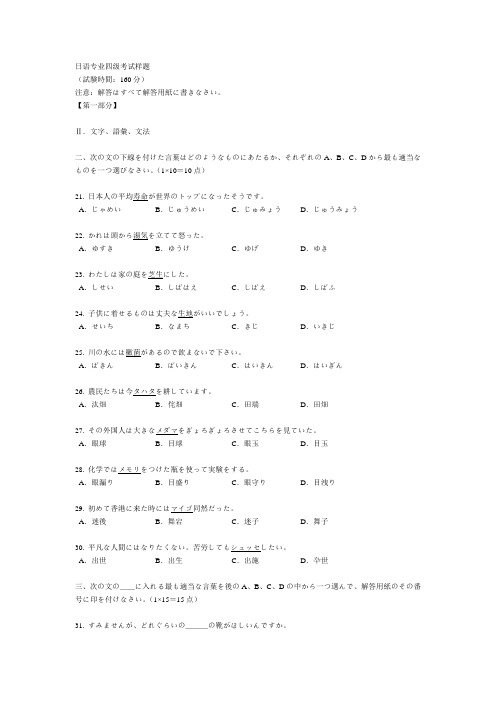
日语专业四级考试样题(試験時間:160分)注意:解答はすべて解答用紙に書きなさい。
【第一部分】Ⅱ.文字、語彙、文法二、次の文の下線を付けた言葉はどのようなものにあたるか、それぞれのA、B、C、Dから最も適当なものを一つ選びなさい。
(1×10=10点)21. 日本人の平均寿命が世界のトップになったそうです。
A.じゃめいB.じゅうめいC.じゅみょうD.じゅうみょう22. かれは頭から湯気を立てて怒った。
A.ゆすきB.ゆうけC.ゆげD.ゆき23. わたしは家の庭を芝生にした。
A.しせいB.しばはえC.しばえD.しばふ24. 子供に着せるものは丈夫な生地がいいでしょう。
A.せいちB.なまちC.きじD.いきじ25. 川の水には黴菌があるので飲まないで下さい。
A.ばきんB.ばいきんC.はいきんD.はいぎん26. 農民たちは今タハタを耕しています。
A.汰畑B.侘畑C.田端D.田畑27. その外国人は大きなメダマをぎょろぎょろさせてこちらを見ていた。
A.眼球B.目球C.眼玉D.目玉28. 化学ではメモリをつけた瓶を使って実験をする。
A.眼漏りB.目盛りC.眼守りD.目洩り29. 初めて香港に来た時にはマイゴ同然だった。
A.迷後B.舞宕C.迷子D.舞子30. 平凡な人間にはなりたくない。
苦労してもシュッセしたい。
A.出世B.出生C.出施D.卆世三、次の文の__に入れる最も適当な言葉を後のA、B、C、Dの中から一つ選んで、解答用紙のその番号に印を付けなさい。
(1×15=15点)31. すみませんが、どれぐらいの___の靴がほしいんですか。
A.サインB.サンダルC.サイズD.サ-ク32. はやい___でしゃべっているので、なかなか聞き取れません。
A.スピーチB.スタートC.スマートD.スピード33. お金も身分証明書もなくしてしまって、___目にあいました。
A.きついB.ひどいC.むずかしいD.くるしい34. そのビルの屋上に上ると、海が___。
日语四级 2006真题
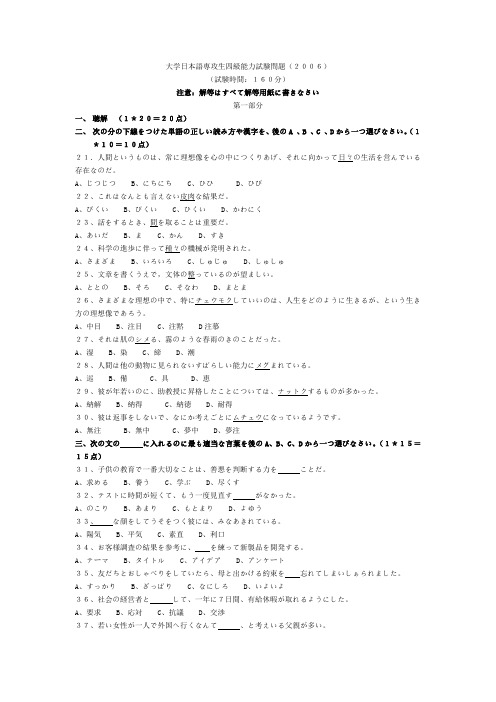
大学日本語専攻生四級能力試験問題(2006)(試験時間:160分)注意:解等はすべて解等用紙に書きなさい第一部分一、聴解(1*20=20点)二、次の分の下線をつけた単語の正しい読み方や漢字を、後のA 、B 、C 、Dから一つ選びなさい。
(1*10=10点)21.人間というものは、常に理想像を心の中につくりあげ、それに向かって日々の生活を営んでいる存在なのだ。
A、じつじつB、にちにちC、ひひD、ひび22、これはなんとも言えない皮肉な結果だ。
A、びくいB、ぴくいC、ひくいD、かわにく23、話をするとき、間を取ることは重要だ。
A、あいだB、まC、かんD、すき24、科学の進歩に伴って種々の機械が発明された。
A、さまざまB、いろいろC、しゅじゅD、しゅしゅ25、文章を書くうえで,文体の整っているのが望ましい。
A、ととのB、そろC、そなわD、まとま26、さまざまな理想の中で、特にチュウモクしていいのは、人生をどのように生きるが、という生き方の理想像であろう。
A、中目B、注目C、注黙 D注慕27、それは肌のシメる、霧のような春雨のきのことだった。
A、湿B、染C、締D、潮28、人間は他の動物に見られないすばらしい能力にメグまれている。
A、巡B、備C、具D、恵29、彼が年若いのに、助教授に昇格したことについては、ナットクするものが多かった。
A、納解B、納得C、納徳D、耐得30、彼は返事をしないで、なにか考えごとにムチュウになっているようです。
A、無注B、無中C、夢中D、夢注三、次の文のに入れるのに最も適当な言葉を後のA、B、C、Dから一つ選びなさい。
(1*15=15点)31、子供の教育で一番大切なことは、善悪を判断する力をことだ。
A、求めるB、養うC、学ぶD、尽くす32、テストに時間が短くて、もう一度見直すがなかった。
A、のこりB、あまりC、もとまりD、よゆう33、な顔をしてうそをつく彼には、みなあきれている。
A、陽気B、平気C、素直D、利口34、お客様調査の結果を参考に、を練って新製品を開発する。
日语专四2004年真题

好的2004年大学日本語専攻生四級能力試験問題(試験時間:140分)注意:解答はすべて解答用紙に書きなさい。
【第一部分】Ⅰ.聴解(1×25=25点)Ⅱ.文字、語彙、文法一、次の文の下線をつけた漢字の正しい読み方を、後のA、B、C、Dの中から一つ選びなさい。
(1×10=10点)26.きめの細かい、なめらかなクリームの方が皮膚に良い。
A.ほそB.ほさC.こめD.こま27.僕はよく休日を利用して旅行にいく。
A.やすみひB.やすみびC.きゅうにちD.きゅうじつ28.彼はさすが有名な歌手だけあって、いい喉をしている。
A.のとB.のどC.のうとD.のうど29.それは客観的現実にあわない、無邪気な考え方にすぎない。
A.ぶじゃけB.ぶじゃきC.むじゃけD.ぶじゃき30.封建的人間関係は、社会の近代化を著しく妨げるものである。
A.はばみB.こばみC.さまたD.さまち31.このような珍しい本を入手することはなかなか容易なことではないんだよ。
A.よいB.よういC.よえきD.ようえき32.きみに恥をかかせるようなことは決してしない。
A.はじB.はずC.はちD.さらし33.頂上へ近づくにしたがってしだいに眺めがよくなる。
A.なぞB.のぞC.ながD.のが34.本屋の店内には天井まで本がぎっしり積み上げられている。
A.てんじょうB.てんせいC.てんいD.てんじん35.技術はね、そう簡単に習えるものではないんだよ。
A.まなB.しゅうC.ならD.しゅ二、次の文__に入れるのに最も適当な言葉を後のA、B、C、Dから一つ選びなさい。
(1×20=20点)36.人間は誰でも、見てはいけない言われると__見たくなるものだ。
A.あまりB.かなりC.なかなかD.よけい37.持っていたお金を__使ってしまって、おみやげも買えなくなった。
A.じゅうぶんB.すっかりC.ずっとD.ちょっと38.病気だと聞いてお見舞いに行ったが、__元気だった。
日语专业四级考试样题 答案
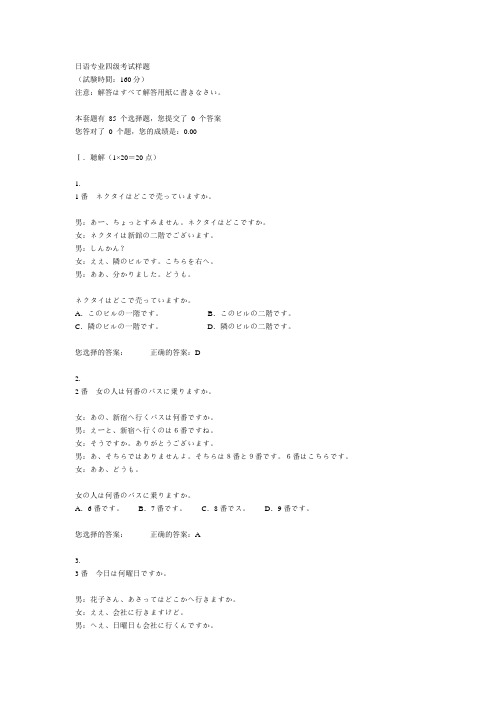
日语专业四级考试样题(試験時間:160分)注意:解答はすべて解答用紙に書きなさい。
本套题有85 个选择题,您提交了0 个答案您答对了0 个题,您的成绩是:0.00Ⅰ.聴解(1×20=20点)1.1番ネクタイはどこで売っていますか。
男:あー、ちょっとすみません。
ネクタイはどこですか。
女:ネクタイは新館の二階でございます。
男:しんかん?女:ええ、隣のビルです。
こちらを右へ。
男:ああ、分かりました。
どうも。
ネクタイはどこで売っていますか。
A.このビルの一階です。
B.このビルの二階です。
C.隣のビルの一階です。
D.隣のビルの二階です。
您选择的答案:正确的答案:D2.2番女の人は何番のバスに乗りますか。
女:あの、新宿へ行くバスは何番ですか。
男:えーと、新宿へ行くのは6番ですね。
女:そうですか。
ありがとうございます。
男:あ、そちらではありませんよ。
そちらは8番と9番です。
6番はこちらです。
女:ああ、どうも。
女の人は何番のバスに乗りますか。
A.6番です。
B.7番です。
C.8番でス。
D.9番です。
您选择的答案:正确的答案:A3.3番今日は何曜日ですか。
男:花子さん、あさってはどこかへ行きますか。
女:ええ、会社に行きますけど。
男:へえ、日曜日も会社に行くんですか。
女:いいえ、あさっては土曜日ですよ。
男:あれ、今日は金曜日でしょう。
女:いいえ、違いますよ。
男:あ、そうか。
今日は何曜日ですか。
A.木曜日です。
B.金曜日です。
C.土曜日です。
D.日曜日です。
您选择的答案:正确的答案:A4.4番男の人は昨日何をしましたか。
女:小林さん、昨日何をしましたか。
男:本を読んでいました。
女:じゃあ、うちにいたんですか。
男:いいえ。
女:あ、じゃあ、図書館?男:いいえ、天気がよかったから公園で。
女:ああ、いいですね。
男の人は昨日何をしましたか。
A.うちにいました。
B.公園で遊びました。
C.図書館に行きました。
D.外で本を読みました。
日本专业四级模拟试题(二)
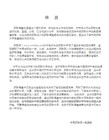
Aのこのこ Bよたよた Cとぼとぼ Dじゃあじゃあ
43、山の上は風が__とても寒い。
Aさわやかで Bつめたくて Cさむくて Dすずしくて
44、忙しくて__その小説は読まなかった。
Aいよいよ Bそろそろ Cとうとう Dたちまち
45、彼にはどこか人を__不思議な魅力がある。
A引きつける B引き受ける C引き入れる D引き取る
46、年が__とすぐ新しい仕事を始める予定です。
A明ける B開ける C更ける D空ける
47、、食べ__にある子供はいくら食べてもおなかを壊さない。
Aづくり Bざかり Cかかり Dなり
(文章3)
百円玉の価値というものは、だれにとっても同じである。通常、ある人にとっては500円の価値を持っているのに、他の人にとっては20円の価値しか持たない百円玉は存在しない。だがここに、別の要素を加えると①話は違ってくる。
②オリンピック記念硬貨というものが発行されたことがある。この記念硬貨も、自動販売機に投入すれば、やはり百円の価値しか持たない。私自身は古銭の流通価格に関する知識を持たないが、しかしこれをコイン業者のところへもっていくと150円で買ってくれたりする。コイン収集家なら、200円で譲ってくれと言うかもしれない。
C来ないもんだ D、来るはずがない
67、そんな仕事ははたし一人ではとても出来ませんから、手伝って___。
Aくださいません Bもらいません
Cあげましょうか Dくるましょうか
68.「社長、山口の結婚式には___か」
Aお出席になります B、出席いたします
56、ニュースによると、北海道___大きい地震があったそうです。
2006年专四真题原文
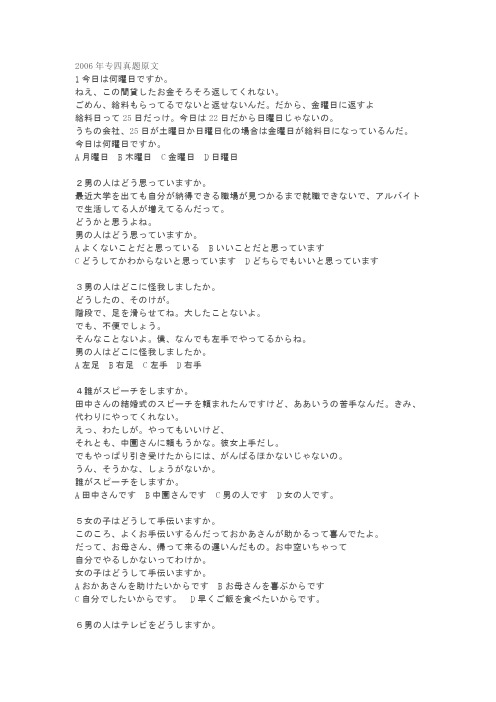
2006年专四真题原文1今日は何曜日ですか。
ねえ、この間貸したお金そろそろ返してくれない。
ごめん、給料もらってるでないと返せないんだ。
だから、金曜日に返すよ給料日って25日だっけ。
今日は22日だから日曜日じゃないの。
うちの会社、25日が土曜日か日曜日化の場合は金曜日が給料日になっているんだ。
今日は何曜日ですか。
A月曜日B木曜日C金曜日D日曜日2男の人はどう思っていますか。
最近大学を出ても自分が納得できる職場が見つかるまで就職できないで、アルバイトで生活してる人が増えてるんだって。
どうかと思うよね。
男の人はどう思っていますか。
Aよくないことだと思っているBいいことだと思っていますCどうしてかわからないと思っていますDどちらでもいいと思っています3男の人はどこに怪我しましたか。
どうしたの、そのけが。
階段で、足を滑らせてね。
大したことないよ。
でも、不便でしょう。
そんなことないよ。
僕、なんでも左手でやってるからね。
男の人はどこに怪我しましたか。
A左足B右足C左手D右手4誰がスピーチをしますか。
田中さんの結婚式のスピーチを頼まれたんですけど、ああいうの苦手なんだ。
きみ、代わりにやってくれない。
えっ、わたしが。
やってもいいけど、それとも、中園さんに頼もうかな。
彼女上手だし。
でもやっぱり引き受けたからには、がんばるほかないじゃないの。
うん、そうかな、しょうがないか。
誰がスピーチをしますか。
A田中さんですB中園さんですC男の人ですD女の人です。
5女の子はどうして手伝いますか。
このころ、よくお手伝いするんだっておかあさんが助かるって喜んでたよ。
だって、お母さん、帰って来るの遅いんだもの。
お中空いちゃって自分でやるしかないってわけか。
女の子はどうして手伝いますか。
Aおかあさんを助けたいからですBお母さんを喜ぶからですC自分でしたいからです。
D早くご飯を食べたいからです。
6男の人はテレビをどうしますか。
うちのテレビ壊れちゃったんだ、新しいの買うかな。
日语专业四级历年真题详解与考试指南【圣才出品】
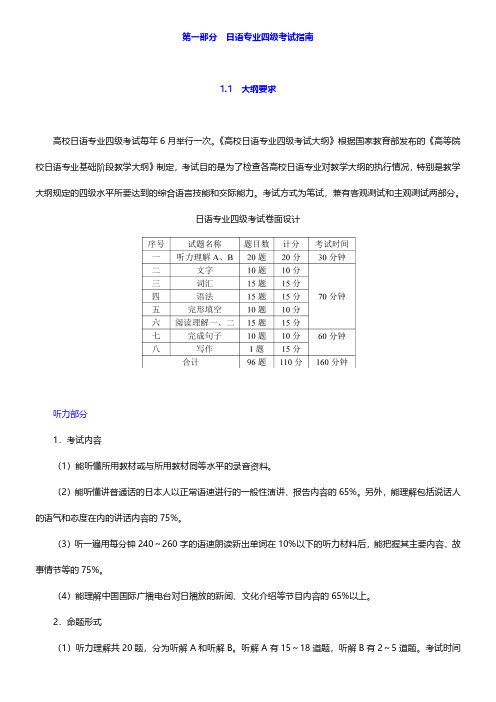
第一部分日语专业四级考试指南1.1大纲要求高校日语专业四级考试每年6月举行一次。
《高校日语专业四级考试大纲》根据国家教育部发布的《高等院校日语专业基础阶段教学大纲》制定,考试目的是为了检查各高校日语专业对教学大纲的执行情况,特别是教学大纲规定的四级水平所要达到的综合语言技能和交际能力。
考试方式为笔试,兼有客观测试和主观测试两部分。
日语专业四级考试卷面设计听力部分1.考试内容(1)能听懂所用教材或与所用教材同等水平的录音资料。
(2)能听懂讲普通话的日本人以正常语速进行的一般性演讲、报告内容的65%。
另外,能理解包括说话人的语气和态度在内的讲话内容的75%。
(3)听一遍用每分钟240~260字的语速朗读新出单词在10%以下的听力材料后,能把握其主要内容、故事情节等的75%。
(4)能理解中国国际广播电台对日播放的新闻、文化介绍等节目内容的65%以上。
2.命题形式(1)听力理解共20题,分为听解A和听解B。
听解A有15~18道题,听解B有2~5道题。
考试时间为30分钟。
各个小题之间有10秒钟的停顿时间用来选择答案。
(2)听解A以男女二人的对话为主,对话内容一般在15句以下。
题材以日常生活为主,涉及衣食住行、家庭生活、学习工作等各方面。
(3)听解B以单人的演讲、报告或说明为主,约10句话左右。
内容多与日常生活相关,涉及人物介绍、行为安排或对某一事件的概括、感想等。
文字词汇部分1.考试内容(1)对文字的测试内容主要是能写出《基础阶段教学大纲》词汇表中所规定的日语汉字的正确读者以及根据读音写出相应的汉字。
掌握常用日语汉字的音读、训读以及特殊读音。
(2)对词汇的测试范围主要包括教学大纲以及四级考试大纲里包含的约5500个词汇。
2.命题形式文字试题共10道,包括根据汉字选择正确的读音以及根据读音选择正确的汉字。
词汇试题共15道,包括对某个单词的考查以及对固定搭配、惯用句等的考查。
语法部分1.考试内容日语专业四级考试语法部分主要考查以下几个方面的内容:(1)对于格助词、副助词、终助词、接续助词等助词的理解和运用能力。
- 1、下载文档前请自行甄别文档内容的完整性,平台不提供额外的编辑、内容补充、找答案等附加服务。
- 2、"仅部分预览"的文档,不可在线预览部分如存在完整性等问题,可反馈申请退款(可完整预览的文档不适用该条件!)。
- 3、如文档侵犯您的权益,请联系客服反馈,我们会尽快为您处理(人工客服工作时间:9:00-18:30)。
日语专业四级-2006年日语专业四级真题1、時間A.しかんB.じがんC.しがんD.じかん2、見られませんA.きられませんB.みいられませんC.みられませんD.きいられません3、一つA.ひとつB.ふだつC.ふたつD.ひどつ4、千円A.せいえんB.せいねんC.せんねんD.せんえん5、父A.すちB.ちぢC.しちD.つち6、目A.てB.あしC.めD.はな7、耳A.くちB.あたまC.みみD.からだ8、水A.くつB.みずC.きってD.くすり9、買ってA.かってB.つくってC.とってD.あらって10、前A.まいB.めえC.めいD.まえ11、立ってA.たってB.すわってC.のってD.とまって12、半分A.はんぷんB.はんぶんC.ほんぶんD.ほんぷん13、聞いてA.きいてB.おいてC.ひらいてD.はたらいて14、古いA.ぬるいB.わるいC.ふるいD.まるい15、電話A.でんきB.でんわC.てんわD.てんき16、がっこうA.学校B.字校C.字枚D.学枚17、やすんだA.体すんだB.体んだC.休すんだD.休んだ18、なんA.同B.何C.向D.伺19、ぱーてぃーA.ベーティーB.バーティーC.パーディーD.パーティー20、あめA.冊B.両C.雨D.再21、いきませんA.行きませんB.仕きませんC.代きませんD.征きません22、かいしゃA.今杜B.会社C.今社D.会杜23、なかA.史B.中C.央D.内24、らいねんA.未年B.未年C.来年D.来年25、ながいA.辰いB.弄いC.兵いD.長い26、わたしはよるシャワーを___。
A.あびますB.とりますC.なきますD.ぬぎます27、ここでたばこを___ぐださい。
A.かけないでB.きえないでC.すわないでD.つかないで28、はじめまして。
どうぞ___。
A.ごめんぐださいB.ごちそうさまC.こんばんはD.よろしく29、たまごは___いりますか。
A.なんこB.なんさつC.なんだいD.なんまい30、あたらしいことばを___。
A.もちますB.なりますC.おぼえますD.つとめます31、きょうはかぜが___です。
A.みじがいB.つよいC.ふといD.ほそい32、うみには___ひとがたぐさんいました。
A.あさいB.うすいC.からいD.わかい33、にほんごでながい___をかきました。
A.にもつB.てがみC.いろD.え34、こうさてんの___にびょういんがあります。
A.そばB.たてC.にわD.はこ35、この___はおいしいです。
A.かびんB.とけいC.めがねD.やさい36、問題Ⅳ______のぶんとだいたいおなじいみのぶんはどれですか。
1234からいちばんいいものをひとつえらびなさい。
わたしはじがへたです。
A.わたしはじがまるくありません。
B.わたしはじがおおきくありません。
C.わたしはじがすきではありません。
D.わたしはじがじょうずではありません。
37、きむらさんのおばさんはあのひとです。
A.きむらさんのおかあさんのおかあさんはあのひとです。
B.きむらさんのおかあさんのおとうさんはあのひとです。
C.きむらさんのおかあさんのいもうとさんはあのひとです。
D.きむらさんのおかあさんのおとうとさんはあのひとです。
38、げんかんにだれかいますよ。
A.いえのいりぐちにひとがいます。
B.がっこうのろうかにひとがいます。
C.まどのちかくにひとがいます。
D.ビルのうえにひとがいます。
39、にほんへははじめていきます。
A.にほんへはあまりいきません。
B.にほんへはまだいっていません。
C.にほんへはよくいきます。
D.にほんへ1かいいきました。
40、やまださんはすずきさんにえいごをおしえました。
A.すずきさんはやまださんにえいごをみせました。
B.やまださんはすずきさんにえいごををみせました。
C.すずきさんはやまださんにかえいごをならいました。
D.やまださんはすずきさんにえいごをならいました。
41、毎日しんぶん___読みます。
A.がB.にC.をD.へ42、きのうのパーティー___何をしましたか。
A.をB.でC.へD.が43、りんご___3つ買いました。
A.がB.にC.のD.を44、どの人___山下さんですか。
A.がB.をC.はD.か45、わたしはおじいさん___よくさんぽをします。
A.とB.をC.のD.へ46、ナイフ___パンをきりました。
A.でB.がC.にD.を47、おすしを食べました。
それから、てんぷら___食べました。
A.がB.かC.はD.も48、すみません、お水___ください。
A.がB.をC.にD.や49、としょかんで3時間べんきょうしました。
でも、うち___しませんでした。
A.とはB.がはC.にはD.では50、わたしは友だち___電話をしました。
A.にB.やC.をD.で51、あにはサッカー___すきです。
A.とB.のC.がD.に52、12時___なりました。
ひるごはんの時間です。
A.がB.にC.かD.へ53、車のうしろ___子どもがいます。
A.にB.でC.をD.へ54、母はかぜ___びょういんへ行きました。
A.にB.がC.でD.は55、カトレア___いう店をしっていますか。
A.をB.がC.にD.と56、わたしのへやはあまり___。
A.きれくないですB.きれくありませんC.きれいありませんD.きれいじゃありません57、きのうははを___ねました。
A.みがくないでB.みがかないでC.みがないでD.みがきないで58、ギターを___ください。
A.ひきてB.ひいてC.ひいでD.ひきって59、あしたはゆきが___でしょう。
A.ふりてB.ふってC.ふるD.ふると60、中山「いますぐでかけましょうか。
」上田「いいえ、そうじを___からでかけましょう。
」A.してB.したC.するD.しって61、さいふを___こまりました。
A.なくしますB.なくしたC.なくすD.なくして62、来週国へ___人はいますか。
A.かえってのB.かえるC.かえるのD.かえって63、もう少し___してくださいませんか。
A.しずかにB.しずかだC.しずかD.しずかで64、先週はしゅくだいが多くて___。
A.たいへんしましたB.たいへんですC.たいへんでしたD.たいへんだったでした65、しごとが___なりました。
A.いそがしいにB.いそがしくC.いそがしいD.いそがしくて66、わたしは外国で___たい。
A.はたらけB.はたらいC.はたらくD.はたらき67、あのケーキは___よ。
A.おいしくなかったB.おいしいくなかったC.おいしいじゃなかったD.おいしくないだった68、___ながら食べないでください。
A.あるくB.あるいてC.あるきD.あるかな69、___ときは、先生に聞きます。
A.わからないのB.わからないC.わかったのD.わかって70、このレストランはいつもたくさん人が___ね。
A.ならんでありますB.ならべていますC.ならんでいますD.ならべてあります71、___でえいがを見ますか。
A.どこB.どんなC.どうD.どのか72、わたしは___買いませんでした。
A.どれをB.いくらC.何かD.何も73、きょうはよる9時___かえります。
A.じゅうB.までC.ごろD.ぐらい74、あしたわたしのへやへあそびに___か。
A.きてくださいB.きましたC.きませんD.きましょう75、ぎゅうにゅうはぜんぶ飲みました。
___ありません。
A.とてもB.もっとC.まだD.もう76、ゆうべは___ねましたか。
A.どんなB.どのぐらいC.いくつD.どちら77、A「かいぎのへやは4かいですね。
」B「___。
5かいですよ。
」A.はい、そっですB.とてもいいですC.いいえ、ちがいますD.わかりません78、A「だれがおさらをあらいましたか。
」B「___。
」A.いいえ、あらいませんでしたB.父のおさらですC.父があらいましたD.はい、あらいました79、(電話で)A「もしもし、すずきです。
そちらに中田さんはいますか。
」B「はい、___。
」A.そちらはすずきですB.ちょっとまってくださいC.そちらにいますD.中田さんですたはい80、A「ごはんを食べてから、おふろに入りますか。
」B「いいえ、わたしは___。
」A.ごはんのまえに入りますB.食べたあとで入りますC.いつも一人で食べますD.ごはんをたくさん食べません81、[___]には何を入れますか。
A.本は29日、ざっしは22日ですB.本は22日、ざっしは29日ですC.本もざっしも29日ですD.本もざっしも22日です82、この学生は何さつかりましたか。
A.3さつB.4さつC.5さつD.6さつ83、この学生はとしょかんで何をしましたか。
A.本に名前を書きました。
B.かみに本の名前を書きました。
C.じしょをかりました。
D.本とざっしをかりました。
84、このとしょかんで学生ができることは何ですか。
A.ざっしを2しゅうかんかりることB.本を5さつかりることC.本やざっしを4さつまでかりることD.本とじしょを1しゅうかんかりること85、これは手がみを出すときにつかいます。
ふうとうにこれをはって、それから、ポストに入れます。
これはゆうびんきょくなどで買います。
「これ」は何ですか。
A.はがきB.きっぷC.ペンD.きって86、きのうは友だちのいえへ行って、友だちがつくったりょうりを食べました。
すこしからかったです。
でも、とてもおいしかったです。
わたしも友だちもたくさん食べました。
また食べたいです。
ただしいものはどれですかA.わたしはりょうりをつくりました。
B.友だちはりょうりがじょうずです。
C.りょうりはおいしくありませんでした。
D.友だちはあまり食べませんでした。
87、わたしのうちから学校まで[___]かかります。
うちからA 駅までじてんしゃで10分です。
A駅からB駅まででんしゃで30分ぐらいです。
それから、B駅でバスにのります。
バスにのってだいたい10分か15分で学校につきます。
[___]には何を入れますか。
A.1時間ぐらい。
B.40分か45分。
C.0分ぐらい。
D.10分か15分。
